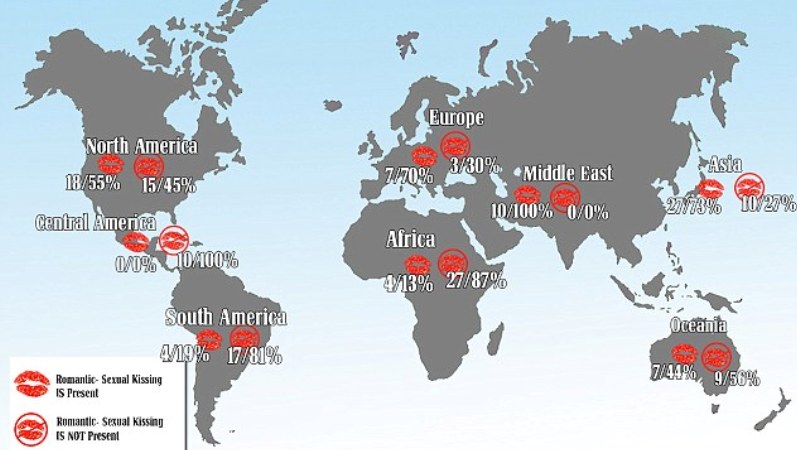Kissing has always been an intimate form of affection. Kind of like a human universal, right?
WRONG.
According to a study published in American Anthropologist, a broad cross-cultural survey of kissing as a token of expressing affection reveals that kissing isn’t a human universal. While it is ubiquitous as an intimate form of sexual attraction in some cultures, certain others rule it out altogether while there are quite a handful of cultures that view it as undesirable and even downright disgusting!
Image source: Shutterstock
The study conducted by scholars Jankowiak, Volsche and Garcia documented the existence or non-existence of the romantic-sexual kiss around the world based on a set of 168 cultures compiled from eHRAF World Cultures (128 cultures) as well as the Standard Cross Cultural Sample (27 cultures) and a survey of 88 ethnographers (13 cultures). The report’s findings are intriguing: rather than an overwhelming popularity of romantic smooching, the global ethnographic evidence suggests that it is common in only 46% (77) of the cultures sampled. The remaining 54% (91) of cultures had no evidence of romantic kissing. There you go- romantic-sexual kissing is not as universal as we might presume.
Image source: eHRAF database
The report also revealed that romantic kissing is most common in the Middle East and Asia, and least common of all among Central American cultures. Similarly, the authors state that “no ethnographer working with Sub-Saharan African, New Guinea, or Amazonian foragers or horticulturalists reported having witnessed any occasion in which their study populations engaged in a romantic–sexual kiss,” whereas it is nearly ubiquitous in northern Asia and North America.
Suggested read: Everything you need to know about French Kissing aka un baiser amoreux
The cross-cultural ethnographic data was further used to examine the relationship between any presence of romantic kissing and a culture’s complexity of social stratification. The report finds that complex societies with distinct social classes (e.g. industrialized societies) have a much more frequent occurrence of this type of kissing than egalitarian societies (e.g. foragers).
Image source: Shutterstock
This rather unexpected yet compelling look into the presence and absence of kissing as a universal nominal of affection posits some further intriguing questions about anthropology- the likes of which may include- what do people from non-romantic kissing societies really think about the practice of “locking lips”? If kissing is not used to show affection, what might it show? What other actions are seen as affectionate where kissing is absent?
The eHRAF World Cultures Database has some answers about the perception of ‘kissing’ in cultures where kissing is unpopular and absent. This perception of kissing vacillates between a broad spectrum of reactions from plain disintrest to amusement to outright disgust and contempt.
Image source: Shutterstock
One anthropologist Wagley records the same in relation to the indigenous Tapirapé people of Central Brazil,
When I described it to them, it struck them as a strange form of showing physical attraction … and, in a way, disgusting. It was common, instead, to see a married couple walking across the village plaza with the man’s arm draped over his wife’s shoulder. A couple might stand close to each other during a conversation with the man’s arms over his wife’s shoulders and she holding him around the hips (Wagley 1977: 158).
Bronislaw Malinowski’s classic account of the impression of ‘kissing’ as a strange foreign custom among the Trobriand Islanders is equally fascinating:
Certainly it never forms a self-contained independent source of pleasure, nor is it a definite preliminary stage of love-making, as is the case with us. This caress was never spontaneously mentioned by the natives, and, to direct inquiries, I always received a negative answer. The natives know, however, that white people “will sit, will press mouth against mouth–they are pleased with it.” But they regard it as a rather insipid and silly form of amusement.
Suggested read: Amazing reasons why you need to hug your partner more
Junod quotes the disgust of the Tsonga people of Southern Africa verbatim:
“Kissing was formerly entirely unknown… When they saw the custom adopted by the Europeans, they said laughingly: “Look at these people! They suck each other! They eat each other’s saliva and dirt!” Even a husband never kissed his wife.”” (Junod 1927: 353-354).
Image source: Google, copyright-free image under Creative Commons License
In certain other cultures, kissing was non-romantic as the act seemed to carry distinctly alternate connotations- those of ritual worship, social status or respect. For instance, in Central America (see, e.g. Nash 1970: 109) and Africa – areas where Jankowiak, et al. suggest instances of romantic kissing are rather low – kissing is often more associated with respect than intimacy.
Either way, it would be safe to say that the study by Jankowiak, Volsche and Garcia has successfully challenged the Western ethnocentric dominant script about the pleasurable act of kissing being a human universal. It may be time to we may want to rethink our ethnocentric biases about expressing affection- for the Perry island people evince that a life without kissing is far from boring! Yes, they rub noses to express affection!
Featured image source: Shutterstock















